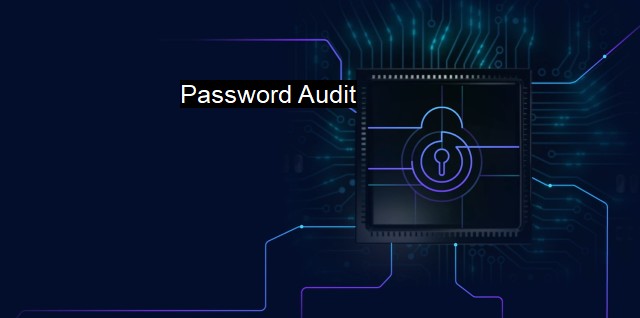What is Password Audit?
The Importance of Password Management: Conducting Password Audits for Stronger Cybersecurity in Today’s Digital Age
A Password Audit, predominantly functioning within the expanses of cybersecurity and antivirus realms, is an intricate process aimed at analyzing and monitoring the strength and reliability of users' passwords in an organization's context. this practice involves evaluating password securities, checking for vulnerabilities, and implementing necessary strategies to fortify these security areas. This fundamental aspect of security is popular as the protean digital era necessitates the superimposed emphasis on secure password policies and practices.a Password Audit is performed to identify weak passwords configured on system user accounts or on specific platforms and applications in an IT environment. The gap in the password's strength is considered a critical risk where attackers could potentially exploit and gain unauthorized access to the system. The efforts engaging the password audit benefit the cybersecurity posture of an organization significantly by potentially closing the loopholes that might allow intruders and unauthorized users access to critical systems.
Performing Password Audits encompasses a range of actions that, when clubbed together, proffer a unified fortification of an organization's password policy. Firstly, avenues get audited where passwords are utilized. These can include user accounts, system administrators, and even service accounts. Following the audit step, the passwords go through a process reminiscent to a 'strength test'. This employs various password cracking tools. These innovative tools function by comparing hash values with those in their database and reveal the likelihood of a password being guessed or hacked. Notably, these supplementary practices within password auditing effectively diagnose the susceptibility of a system's password policy to veiled threats.
Once concluded, these audits consequently present a structural result - an overview that allows one to understand the vulnerability points and thereby outline strategies towards bolstering password security. Within this step also lies the crucial practice of recommending changes - these include prescribing stronger passwords, password controls, two-factor authentication, biometric authentication, and essentially pushing a stronger, robust password policy overall.
Performing systematic password audits steadily works towards strengthening cybersecurity within an organizational realm. Considering that passwords essentially act as the first line of defense in maintaining cybersecurity, their strength can essentially make or break the security efforts. By identifying weak passwords and enforcing stringent demands towards password configurations, password audits ensure the credentials are less likely to be decoded by hackers.
Imperatively, it is crucial that an organization adopts dynamic password policy configurations simultaneously as – and sometimes preceding - the digital age's evolutionary pathway. In this context, these extensive audits are, by all means, a key solution, so much so that organizations conduct password audits periodically - often quarterly. This pattern negates staled iterations of security measures, matching pace with the constantly evolving digital world that poses recurrent threats.
Intersectionally, Password Audits further play an auxiliary role in antivirus implementations. Understandably, the severity of attacks addressed by the antivirus significantly lessens with strong passwords. Here, Password Audits potentially prevent hackers from disabling security systems like antivirus software, thereby intensifying the antivirus's efficiency.
One crucial disclaimer that must indeed offset the discussion around password audits is the essence of ethics undeniably bound with password audits. Indeed, while password cracking tools have legitimate use for performing password audits, these versatile tools often fall into the wrong hands, leading to cases of unauthorized and illegal access. As such, notwithstanding its value to the organization security system, the password audit process must abide by stringent ethical guidelines.
To encapsulate, Password Audits are fundamentally aimed at curating platforms robust enough to offset potential cyber threats. It propagates the necessity of having strong and secure passwords whilst still accentuating the changing cybersecurity landscape's fluid requirements. More than an operational practice, it becomes a philosophy aiming to circumvent any cyber risks associated with password vulnerabilities and eventually optimize cybersecurity and antivirus functionality.

Password Audit FAQs
What is a password audit?
A password audit is a process of checking and analyzing the password security of an individual or organization. It involves reviewing the integrity and strength of passwords used to protect sensitive information, as well as identifying vulnerabilities that could be exploited by cybercriminals.Why is a password audit important?
A password audit is important because passwords are the primary defense against cyber-attacks. Weak passwords are easy targets for hackers who can compromise your system, steal sensitive data, and cause significant financial loss. A password audit helps to identify weak passwords and can help you strengthen your overall security posture.How often should a password audit be conducted?
A password audit should be conducted on a regular basis, at least once a year, or whenever there is a significant change in the organization's IT infrastructure. This ensures that you are continuously improving your security posture and identifying any potential vulnerabilities before they can be exploited by cybercriminals.What are some best practices for conducting a password audit?
Some best practices for conducting a password audit include using strong and complex passwords, enforcing password policies, implementing multi-factor authentication, educating employees about password hygiene, and using reliable password management tools. It is also essential to regularly monitor and update passwords to ensure maximum security.| | A | | | B | | | C | | | D | | | E | | | F | | | G | | | H | | | I | | | J | | | K | | | L | | | M | |
| | N | | | O | | | P | | | Q | | | R | | | S | | | T | | | U | | | V | | | W | | | X | | | Y | | | Z | |
| | 1 | | | 2 | | | 3 | | | 4 | | | 7 | | | 8 | | |||||||